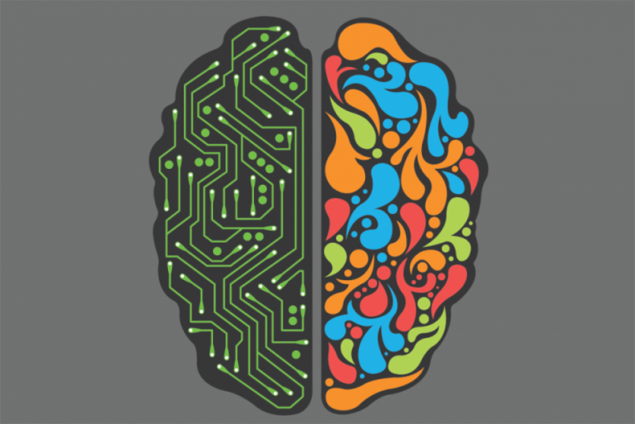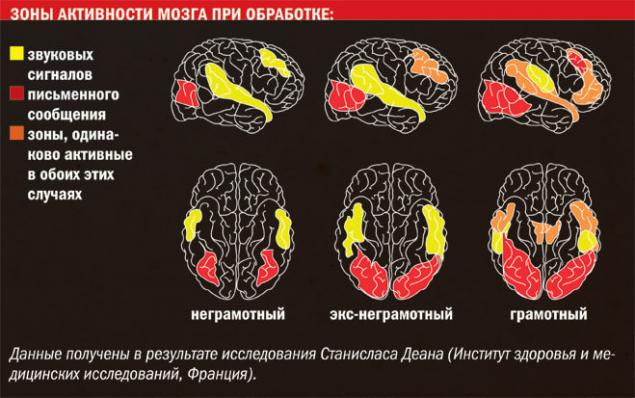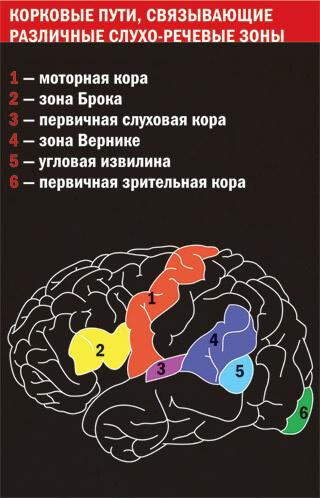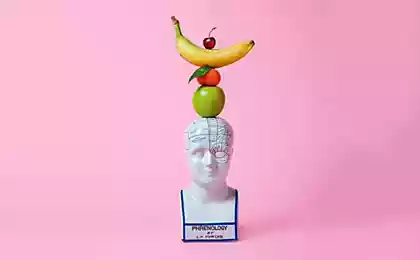299
How the brain works while reading
Since you're with us now, you almost certainly can read. And now you will find out why you are incredibly lucky with this, and perhaps even more lucky if you finish this article.
Man learned to read about six thousand years ago. It was then that the comics that people of antiquity loved to leave each other on the walls of caves and tree trunks as a kind of wall newspaper:
sign "Vasya", sign "club", sign "lion"
sign "Lion", sign "Eat", sign "Vasya",
They began to develop into what would later become pictographic writing and hieroglyphics (the appearance of alphabets based on phonetics will have to wait a little longer).

Since then, the word “literate” has become synonymous with the word “smart.”
The historical and social significance of writing is enormous. In fact, it was a million times cooler than the invention of a bow, a wheel or, say, an internal combustion engine. Because it was then that humanity was able to cope with time and space at the same time: henceforth, word and, accordingly, knowledge on this planet gained immortality.
But when we understand this enormous historical significance of reading, we often fail to think about what it has done to humans on a physiological level. No, it's not about glasses and slouching.
How the brain works while reading
Now, while you're reading these words, your brain is burning inside your skull like a New Year's tree, which is clearly visible in CT scans. While your eyes are jumping along the lines (yes, it sounds strange, of course, but that’s how we read: generally smoothly, but with periodic jerks, it’s like a hanging roller), your head is boiling work.
Neural signals are desperately rushing through the closets and rubble of your giant temple of mind, desperately shaking up every rag and hastily searching for the meanings of hastily deciphered symbols.

It looks something like this:
- Hey, we're looking for "skinny"? No one's seen "skinny"? Where the hell are all the synonyms? So... “dry”, “wrinkled”, “cooked” – no, this is not at all the same. .
- Just hang a picture of an old boot in front of him, he'll figure it out.
- It's too late, by now! A pemmican is urgently needed!
- "Skinned Pemmican"? What the hell is that? Are they all crazy? Put the context out, loboshakes!
- "Skinned pemmican stuck in old Crow's wampum!"
- God!
- Quick, quick! Late!
- What is he reading?
- "My life among the Indians."
- Oh, right, Indians, bli-i-in... The active dictionary can be discarded again. We will have to dive in childhood, in the Coopers of all sorts of Ibn Fenimor... And there are such associations - such teeth, such mouths! They'll eat you and you won't have time to peep!
- No need to have an active dictionary of five hundred words.
- So we develop as much as we can ... by regular reading ... yes.
- I can't do it anymore, the synapses are falling off. Hey, primaries! Insinuate to him that it is time to go to the toilet - go to the sphincter of the bladder, let the old friendship help!
We rarely think about what reading has done to us on a physiological level.
We perceive sound information much less dramatically, because our brains evolved in conditions in which the ability to quickly decipher sound signals was very, very important. The sneezing of a leopard in distant bushes instantly brings order to the synapses that you do not have time to realize anything, and your legs have already developed an average cruising speed, forty kilometers per hour.
Reading is different. The texts do not flash before us black and yellow spots, do not lick carnivorously, do not show you the delightful elasticity of the mammary glands of a beauty from a neighboring tribe. It's just small black icons, a pathetic centipede crawling on a white paper sheet.
To turn them into meaningful signals, your brain has to work hard. And he has few helpers. Listening to someone else’s speech, we perceive the intonation of the speaker, his breathing, the degree of his excitement and enthusiasm, and graphic symbols do not give this.

When you read, the primary visual cortex is activated first. She's kind of making a mold of a word. After that, this cast is sent to the angular gyrus, where the visual form of the words find its acoustic analogue stored in the Wernicke zone.
It is in the Wernicke zone that the word is understood, and at the same time its representation is activated in the Broca area located in the third frontal gyrus. Activation of the Broca zone after understanding the meaning of speech, thanks to the participation of the Wernicke zone, is provided by a group of fibers called an arc-shaped beam. In Broca's zone, information from Wernicke's zone leads to a detailed articulation program. The implementation of this program is carried out through the activation of the facial projection of the motor cortex, which controls the speech muscles and is associated with the Broca zone with short fibers” (Human Physiology). Pokrovsky V. M., Korotko G. F. and others.
The more and better you read, the faster the process takes place. In people with the best reading skills, it takes a tiny fraction of a second, so they barely “hear” the word they read, while people with poor reading skills literally say every word to themselves.
If the brain is so hard to read, why bother it?
Why go to the gym? No other exercise is as complete and universal for the brain as reading. No amount of chess, logic, and crossword puzzles will provide such a load, because they involve much more limited areas of the brain. Thirty minutes of reading per day reduces, for example, the risk of developing Alzheimer’s in healthy patients over forty-five years of age by almost a third (this data is confirmed by the group of Inna Slatsky (University of Tel Aviv, Israel).

5 Questions About Reading
1. How do you learn to read fast?
Practice. The more you read, the better the skill. And also try to learn to read without repeating words about yourself, but just gliding through the lines with your eyes. At first you won't understand anything, then you'll slowly get involved.
2. Why do I turn off while reading? I read half a page and don’t remember anything.
Because your brain took a little pause and arbitrarily stopped processing the incoming information. This happens during the reception of sound signals - in lectures, for example. It’s OK if it doesn’t happen too often – kick your attention and read it again. If you shut down too often, every 10 minutes or more, you have ADD. It is also amenable to training, although in the United States and Israel, for example, it is preferred to be treated with medication, especially in children.
3. With the development of technology, books and reading are coming to the third place, right?
Humanity has never written and read as much as it has written and read since the advent of the Internet and SMS. What it writes and reads is another conversation, but most of the inscriptions on all sorts of ancient stelae are not very different, say, from posts on game forums: “Today, I, Great Mumuk, trampled my fifth and a thousand enemies, and the vile Bubuka I will catch and release his guts.” Something like that.
4. Now it is widely believed that it is not necessary to accustom the child to reading too early - all in time. Is that right?
According to the author of this article, this opinion can only spread pests. The earlier the child learns reading skills, the easier it will be for him to read and the more books he will learn at a time when the information received is especially well fixed in memory.
5. How can a modern adult learn to read if he does not have enough time?
(The Art of Reasoning About Books You Haven't Read by Pierre Bayard)
But improving the quality of brain work is not the main benefit from reading. Let us leave aside the education, cultural level and ability to maintain a secular conversation (practice suggests that for some reason Murakami, Tolstoy and Dickens are very rarely mentioned in secular conversations, where the names of Yoji Yamamoto, Koko Chanel and Slava Zaitsev are much more often heard).
Expansion of vocabulary can also be achieved not only by reading: listening to audio books, say, or just frequent communication with well-read interlocutors will inevitably make your speech and your thoughts much richer. More important is the ability of our minds to respond very well to bibliotherapy.
Climb to other worlds
This term appeared in the middle of the last century, but to treat mentally ill and simply mentally unstable people with the help of books began a hundred years before (by the way, one of the pioneers of this case was our compatriot I. Dyadkovsky). Precisely because reading so actively involves virtually our entire brain, it can radically change our mood, well-being and attitude.
Roughly speaking, if our stressed and depressed brain paints us a sad picture of the devastation of the world in general and of ourselves in particular, then the situation can be improved by forcing this brain to intensively process other pictures - with fluttering butterflies, pink elephants and brave Indians stealing blond beauties.
Bibliotherapy is an opportunity to go to other worlds in search of spiritual comfort.
And there was no movie around, because no great Tarantino can make your brain believe in the true reality of what is happening. Precisely because a simple visual signal, a picture from a screen, in our head is not subjected to a tenth of the processing and decoding that the printed word passes. Here, read the phrase slowly:
In the heart of a dark forest on a clumsy branch of an old pine hangs a small white porcelain kettle with a green rose on its side.
"Infertility epidemics": myths about conception after 35
A session of instant relief from bad luck
You know what we just did? We made you imagine this forest, this pine and this stupid kettle. You brought them out of nothingness as you saw them, and from now on they will remain here forever. Congratulations. There is no other way to escape to other worlds so well and so securely as reading.
And the better a person’s reading skills, the faster and more actively he devours pages, the deeper and more complete the illusion. This, by the way, is one of the reasons why a lot of people who read a lot rarely become drunks and drug addicts - because they do not need it. At their service and so tens of thousands of realities, helpfully opening their accessible pages.
Author: Tata Oleynik
P.S. And remember, just by changing your consciousness – together we change the world!
Source: cameralabs.org/10507-o-polze-chteniya-pochemu-chitayushchie-lyudi-redko-stanovyatsya-alkogolikami-i-narkomanami
Man learned to read about six thousand years ago. It was then that the comics that people of antiquity loved to leave each other on the walls of caves and tree trunks as a kind of wall newspaper:
sign "Vasya", sign "club", sign "lion"
sign "Lion", sign "Eat", sign "Vasya",
They began to develop into what would later become pictographic writing and hieroglyphics (the appearance of alphabets based on phonetics will have to wait a little longer).

Since then, the word “literate” has become synonymous with the word “smart.”
The historical and social significance of writing is enormous. In fact, it was a million times cooler than the invention of a bow, a wheel or, say, an internal combustion engine. Because it was then that humanity was able to cope with time and space at the same time: henceforth, word and, accordingly, knowledge on this planet gained immortality.
But when we understand this enormous historical significance of reading, we often fail to think about what it has done to humans on a physiological level. No, it's not about glasses and slouching.
How the brain works while reading
Now, while you're reading these words, your brain is burning inside your skull like a New Year's tree, which is clearly visible in CT scans. While your eyes are jumping along the lines (yes, it sounds strange, of course, but that’s how we read: generally smoothly, but with periodic jerks, it’s like a hanging roller), your head is boiling work.
Neural signals are desperately rushing through the closets and rubble of your giant temple of mind, desperately shaking up every rag and hastily searching for the meanings of hastily deciphered symbols.

It looks something like this:
- Hey, we're looking for "skinny"? No one's seen "skinny"? Where the hell are all the synonyms? So... “dry”, “wrinkled”, “cooked” – no, this is not at all the same. .
- Just hang a picture of an old boot in front of him, he'll figure it out.
- It's too late, by now! A pemmican is urgently needed!
- "Skinned Pemmican"? What the hell is that? Are they all crazy? Put the context out, loboshakes!
- "Skinned pemmican stuck in old Crow's wampum!"
- God!
- Quick, quick! Late!
- What is he reading?
- "My life among the Indians."
- Oh, right, Indians, bli-i-in... The active dictionary can be discarded again. We will have to dive in childhood, in the Coopers of all sorts of Ibn Fenimor... And there are such associations - such teeth, such mouths! They'll eat you and you won't have time to peep!
- No need to have an active dictionary of five hundred words.
- So we develop as much as we can ... by regular reading ... yes.
- I can't do it anymore, the synapses are falling off. Hey, primaries! Insinuate to him that it is time to go to the toilet - go to the sphincter of the bladder, let the old friendship help!
We rarely think about what reading has done to us on a physiological level.
We perceive sound information much less dramatically, because our brains evolved in conditions in which the ability to quickly decipher sound signals was very, very important. The sneezing of a leopard in distant bushes instantly brings order to the synapses that you do not have time to realize anything, and your legs have already developed an average cruising speed, forty kilometers per hour.
Reading is different. The texts do not flash before us black and yellow spots, do not lick carnivorously, do not show you the delightful elasticity of the mammary glands of a beauty from a neighboring tribe. It's just small black icons, a pathetic centipede crawling on a white paper sheet.
To turn them into meaningful signals, your brain has to work hard. And he has few helpers. Listening to someone else’s speech, we perceive the intonation of the speaker, his breathing, the degree of his excitement and enthusiasm, and graphic symbols do not give this.

When you read, the primary visual cortex is activated first. She's kind of making a mold of a word. After that, this cast is sent to the angular gyrus, where the visual form of the words find its acoustic analogue stored in the Wernicke zone.
It is in the Wernicke zone that the word is understood, and at the same time its representation is activated in the Broca area located in the third frontal gyrus. Activation of the Broca zone after understanding the meaning of speech, thanks to the participation of the Wernicke zone, is provided by a group of fibers called an arc-shaped beam. In Broca's zone, information from Wernicke's zone leads to a detailed articulation program. The implementation of this program is carried out through the activation of the facial projection of the motor cortex, which controls the speech muscles and is associated with the Broca zone with short fibers” (Human Physiology). Pokrovsky V. M., Korotko G. F. and others.
The more and better you read, the faster the process takes place. In people with the best reading skills, it takes a tiny fraction of a second, so they barely “hear” the word they read, while people with poor reading skills literally say every word to themselves.
If the brain is so hard to read, why bother it?
Why go to the gym? No other exercise is as complete and universal for the brain as reading. No amount of chess, logic, and crossword puzzles will provide such a load, because they involve much more limited areas of the brain. Thirty minutes of reading per day reduces, for example, the risk of developing Alzheimer’s in healthy patients over forty-five years of age by almost a third (this data is confirmed by the group of Inna Slatsky (University of Tel Aviv, Israel).

5 Questions About Reading
1. How do you learn to read fast?
Practice. The more you read, the better the skill. And also try to learn to read without repeating words about yourself, but just gliding through the lines with your eyes. At first you won't understand anything, then you'll slowly get involved.
2. Why do I turn off while reading? I read half a page and don’t remember anything.
Because your brain took a little pause and arbitrarily stopped processing the incoming information. This happens during the reception of sound signals - in lectures, for example. It’s OK if it doesn’t happen too often – kick your attention and read it again. If you shut down too often, every 10 minutes or more, you have ADD. It is also amenable to training, although in the United States and Israel, for example, it is preferred to be treated with medication, especially in children.
3. With the development of technology, books and reading are coming to the third place, right?
Humanity has never written and read as much as it has written and read since the advent of the Internet and SMS. What it writes and reads is another conversation, but most of the inscriptions on all sorts of ancient stelae are not very different, say, from posts on game forums: “Today, I, Great Mumuk, trampled my fifth and a thousand enemies, and the vile Bubuka I will catch and release his guts.” Something like that.
4. Now it is widely believed that it is not necessary to accustom the child to reading too early - all in time. Is that right?
According to the author of this article, this opinion can only spread pests. The earlier the child learns reading skills, the easier it will be for him to read and the more books he will learn at a time when the information received is especially well fixed in memory.
5. How can a modern adult learn to read if he does not have enough time?
(The Art of Reasoning About Books You Haven't Read by Pierre Bayard)
- You know where to go with the book.
- Transfer from private to public transport.
- Read books from phones and computers.
- In general, automatically read everything you have on hand if you have been sitting for three minutes and doing nothing.
- Read the books you have already read. It is better to know 20 books well than not to remember a hundred books.
- An inexperienced reader should read what he likes, not what he needs to read (“How can a cultured person not know Heptameron?!”) or prestigious (“How have you not read Telluria yet?”).
But improving the quality of brain work is not the main benefit from reading. Let us leave aside the education, cultural level and ability to maintain a secular conversation (practice suggests that for some reason Murakami, Tolstoy and Dickens are very rarely mentioned in secular conversations, where the names of Yoji Yamamoto, Koko Chanel and Slava Zaitsev are much more often heard).
Expansion of vocabulary can also be achieved not only by reading: listening to audio books, say, or just frequent communication with well-read interlocutors will inevitably make your speech and your thoughts much richer. More important is the ability of our minds to respond very well to bibliotherapy.
Climb to other worlds
This term appeared in the middle of the last century, but to treat mentally ill and simply mentally unstable people with the help of books began a hundred years before (by the way, one of the pioneers of this case was our compatriot I. Dyadkovsky). Precisely because reading so actively involves virtually our entire brain, it can radically change our mood, well-being and attitude.
Roughly speaking, if our stressed and depressed brain paints us a sad picture of the devastation of the world in general and of ourselves in particular, then the situation can be improved by forcing this brain to intensively process other pictures - with fluttering butterflies, pink elephants and brave Indians stealing blond beauties.
Bibliotherapy is an opportunity to go to other worlds in search of spiritual comfort.
And there was no movie around, because no great Tarantino can make your brain believe in the true reality of what is happening. Precisely because a simple visual signal, a picture from a screen, in our head is not subjected to a tenth of the processing and decoding that the printed word passes. Here, read the phrase slowly:
In the heart of a dark forest on a clumsy branch of an old pine hangs a small white porcelain kettle with a green rose on its side.
"Infertility epidemics": myths about conception after 35
A session of instant relief from bad luck
You know what we just did? We made you imagine this forest, this pine and this stupid kettle. You brought them out of nothingness as you saw them, and from now on they will remain here forever. Congratulations. There is no other way to escape to other worlds so well and so securely as reading.
And the better a person’s reading skills, the faster and more actively he devours pages, the deeper and more complete the illusion. This, by the way, is one of the reasons why a lot of people who read a lot rarely become drunks and drug addicts - because they do not need it. At their service and so tens of thousands of realities, helpfully opening their accessible pages.
Author: Tata Oleynik
P.S. And remember, just by changing your consciousness – together we change the world!
Source: cameralabs.org/10507-o-polze-chteniya-pochemu-chitayushchie-lyudi-redko-stanovyatsya-alkogolikami-i-narkomanami
Effective natural remedy for arthritis of the knee joint
5 design techniques that you can replicate at home























